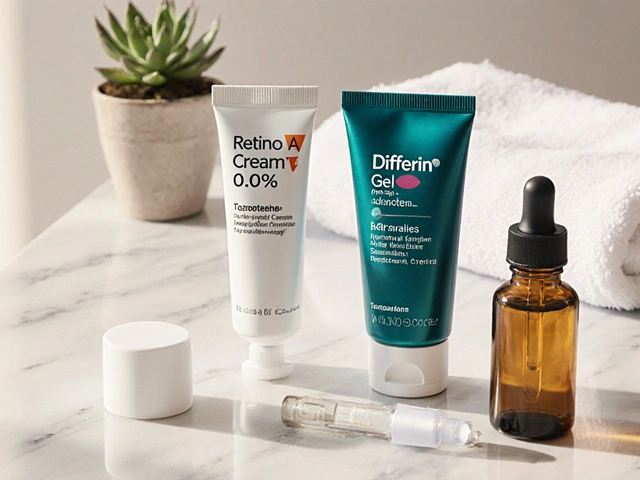Wading through sketchy online pharmacies feels like navigating a minefield if you’re hunting for antibiotics like Fosfomycin. The stakes are high, especially when your health is on the line. Stories of fake pills, unreliable websites, and customs clampdowns aren’t just scare tactics—they’re real. But people keep looking because Fosfomycin solves tough problems, especially when it comes to stubborn urinary tract infections (UTIs). If traditional antibiotics aren’t getting the job done, this one often enters the picture. But figuring out how and where to buy Fosfomycin online without getting scammed or breaking the law is where things get interesting. Let’s talk details, strategies, and red flags so you don’t have to learn the hard way.
Understanding Fosfomycin: What Makes It Special?
Fosfomycin isn’t just another random antibiotic; it packs a punch against bacteria that laugh in the face of other drugs. Made in the 1960s, this antibiotic has found a new spotlight as bacteria around the globe become harder to treat. In many countries, Fosfomycin is prescribed for UTIs, thanks to how quickly it clears up symptoms with a single hefty dose. If you’ve faced the misery of a painful, relentless infection, you know why people hunt down this medication even if their local pharmacy doesn’t always have it in stock.
What makes Fosfomycin unique is its mechanism. It blocks bacterial cell wall synthesis at a different stage compared to old-school antibiotics. Bacteria that scoff at penicillin or ciprofloxacin often get knocked out by Fosfomycin. Major medical guidelines, like the ones from the Infectious Diseases Society of America, have elevated its status for certain infections. In fact, in 2023, a study in The Lancet pointed out it has fewer side effects compared to fluoroquinolones, especially when prescribed for women dealing with recurring UTIs.
In the US, Fosfomycin comes as a powder for oral solution (think sachets you mix with water), usually the brand Monurol. Europe and parts of Asia have additional options: intravenous forms or even pills. That big orange powder packet—typically a 3g dose—is famous for its one-and-done routine, with just a single dose prescribed for most uncomplicated bladder infections.
But it isn’t a wonder-cure for everything. Doctors often warn about growing resistance, so taking it without clear need or prescription just adds fuel to the superbug fire. Still, those living in areas where access is tricky or who’ve dealt with pharmacies routinely out of stock may look online. And since it’s not a controlled substance in most countries but is still prescription-only, buying online is all about balancing safety, legality, and getting the real thing instead of sugar powder or, worse, something toxic.
Where to Buy Fosfomycin Online: Finding Safe Sources
Not every website with a doctor-looking homepage and fancy pop-ups delivers the real deal. Lots of online pharmacies claim “authentic” or “FDA-approved” drugs, but many just ship whatever they can get—sometimes nothing at all. The hunt for reliable Fosfomycin sources changes each year thanks to new regulations and enforcement priorities, but some patterns hold true.
Let’s start with the gold standard: secured, government-licensed online pharmacies. Countries like the UK, Canada, Australia, and Germany have verified websites connected to actual brick-and-mortar pharmacies. Look for ones listed in your government’s pharmacy registry—that’s a game-changer for safety. For example, Canada’s CIPA (Canadian International Pharmacy Association) lists certified members. The National Association of Boards of Pharmacy (NABP) runs a “Digital Pharmacy Accreditation” program, and you can check the USA’s LegitScript database for rating online sellers. Those tools offer some peace of mind that you’ll get real Fosfomycin online and not worthless powder.
International pharmacy websites based in India, Turkey, and Eastern Europe usually have cheaper prices, but extra caution is needed. Some are legitimate—especially those with a track record, lots of detailed product info, and responsive customer support via chat or phone. Look for clear documentation, batch numbers, expiration dates, and company addresses matching those found on Health Ministry lists.
- Avoid sites asking only for a shipping address and payment, with zero questions about your prescription or health history. This is a classic sign of a rogue operation.
- Be wary of pharmacies that only accept cryptocurrency, Western Union, or vouchers. Real pharmacies typically process credit cards or offer PayPal and other traceable payment methods.
- If you see prices that seem like a steal—say, $5 for a type of drug that costs $50 elsewhere—run, don’t walk. Counterfeiters count on bargain-seekers.
One trick lots of people overlook is checking if their insurance covers a portion of international pharmacy orders. Sometimes, with the right paperwork, you can get reimbursed. Contact your insurer or local health system ahead of time if you’re looking to save on costs while staying legal.
And don’t underestimate real-world tips. Forums like Reddit’s r/antibiotics or patient advocacy Facebook groups swap updated recommendations about trustworthy pharmacies. These communities, while not always perfect, can alert you to scam sites that claim they’re legit until a batch of users gets ghosted.

How to Buy: Process, Tips, and Pitfalls
Ordering antibiotics online seems easy if you just click “add to cart,” but reputable sources want more than your shipping info. Here’s how the legit process usually works:
- Prescription First: Any credible pharmacy (even online) requires a prescription. Some sites offer a telehealth appointment where you fill out a questionnaire, talk with a licensed doctor, and get a prescription approved and uploaded. If a site skips this and ships on your word alone, you’re likely dealing with a gray or black-market vendor.
- Verification and Product Check: After completing your order, you’ll usually be able to check shipment status via tracking. The best sites send photos of the box, lot number, and expiration date before shipping. Big green flag if you see that.
- Regulations and Customs: Know your country’s laws. Some places (like Canada and most of Europe) allow individuals to import a reasonable supply for personal use, while others (like the US) strictly regulate the importation. Packages can get seized, especially if you order quantities exceeding a personal-use allowance, or the product lacks documentation. Customs forms should say exactly what’s inside rather than a vague “supplement.”
- Payment Security: If you’re using credit cards, check for “https” in the browser and a lock icon. Never send money via wire transfer unless you’re 100% sure of the seller. If the pharmacy’s name doesn’t match the billing info, ask questions before proceeding.
- Customer Service: Test customer support by sending them a message with a question (even a basic one). Real companies respond in under 24 hours and provide answers beyond a copy-paste response.
- Deliveries and Return Policy: Read the fine print. Some pharmacies offer guaranteed reshipment if a package gets lost or held by customs; others don’t. Follow tracking updates and don’t ignore texts or emails asking for extra documentation when your package is en route.
Sometimes, you’ll find online sellers claiming they can ship without a prescription, labeling Fosfomycin as a “dietary supplement” or “research compound.” This is risky—not just because of the law, but because you have no safety assurances. In 2022, the FDA reported dozens of shipments containing bulk powder labeled as Fosfomycin that turned out to be misbranded food starch. It’s just not worth the gamble with your health.
An insider trick: search specialist platforms such as PharmacyChecker.com. Here, pharmacies are graded based on transparency, medication origin, and customer feedback. Combine this with user reviews and recent Reddit threads for real-time feedback on shipping success, packaging quality, and potency.
If you’re worried about privacy, double-check the pharmacy’s data policies. The best ones don’t share, sell, or store your medical details long-term. If you see pop-up ads for unrelated products or get strange marketing emails after your order, unplug and change your data-sharing permissions immediately.
Legal Tips, Safety Advice, and When to Consult a Doctor
Laws around buying prescription drugs online change fast. As of July 2025, the US still doesn’t allow importing most prescription meds, but people skirt rules for personal use if quantities stay small and a valid prescription is included in the shipment. Europe has harmonized online pharmacy rules, but each country’s border agents may interpret imports differently.
If you care about avoiding fines—or, in rare cases, criminal charges—know your national and local rules before hitting “buy.” Some countries allow you to import up to a 3-month supply with a prescription; others confiscate medicine and slap you with a warning letter. Don’t expect customs to treat Fosfomycin like vitamins.
Beyond the legal maze, your safety comes first. Counterfeit Fosfomycin is a real problem, with World Health Organization bulletins warning since 2020 that fake antibiotics pop up especially in online black markets. Counterfeits usually lack active ingredient, have wrong dosages, or are contaminated. The only real safeguard is sticking to trusted, well-reviewed pharmacies and always checking the packaging, lot numbers, and expiry dates when your delivery arrives. If something seems off—wrong language on the box, broken seals, or unknown branding—contact the pharmacy before taking anything.
One little-known fact: Fosfomycin does interact with some medicines, including metoclopramide, which can reduce its effectiveness. Always double-check combinations with your doctor or a pharmacist—don’t rely on online forums for these details. Even online pharmacies with great reputations offer pharmacist chat—use it, it’s free and confidential.
Remember, antibiotics aren’t one-size-fits-all. If symptoms persist, or if you haven’t had a medical checkup in a while, speak to a doctor before buying or taking any new drug, even if it worked for you in the past. Improper use of Fosfomycin not only risks your own recovery but can make the global resistance problem worse.
- Keep detailed records of your order, payment, and communication with the pharmacy.
- Report suspicious sites to regulatory authorities—most have anonymous online forms.
- Read up on the latest World Health Organization and FDA safety bulletins.
Buying Fosfomycin online has gotten easier—and riskier—in 2025. Real pharmacies do exist, and plenty of satisfied customers successfully treat recurring UTIs this way, especially when their local supply chain lets them down. Use your head: stick to sites with verified credentials, double-check laws, never use a product if packaging is busted or details don’t match up, and—most crucially—have an up-to-date prescription. Taking a few extra steps can guard your health, cash, and peace of mind.








Posts Comments
shawn monroe July 30, 2025 AT 10:41
Fosfomycin’s mechanism of action is a game-changer for MDR Gram-negatives-especially E. coli with extended-spectrum beta-lactamases (ESBLs). The 3g single-dose sachet bypasses compliance issues entirely. But here’s the kicker: most online vendors don’t even know the difference between fosfomycin trometamol and fosfomycin disodium. If you’re ordering from a site that just says ‘Fosfomycin’ without specifying the salt form, you’re gambling with pharmacokinetics. 💣
marie HUREL August 1, 2025 AT 01:28
I’ve ordered from a Canadian pharmacy listed on NABP for my recurrent UTIs. Took 10 days to arrive, but the box had the lot number, expiration, and even a printed prescription label. No issues with customs. Just make sure your doctor writes ‘for personal use’ on the script. It helps.
Lauren Zableckis August 2, 2025 AT 07:25
Why are people so okay with bypassing prescriptions? Antibiotics aren’t supplements. You wouldn’t take insulin without a diagnosis, so why this?
Asha Jijen August 2, 2025 AT 17:01
India has the best prices bro like 100 rupees for a sachet and they ship fast no drama just dont buy from those fake sites with bad photos and no reviews
reshmi mahi August 2, 2025 AT 22:02
USA thinks it owns antibiotics now? 😂 We’ve been making real Fosfomycin for decades while y’all were busy suing pharmacies for selling painkillers. If you want it cheap and real, go Indian. Your body will thank you. 💪
laura lauraa August 3, 2025 AT 23:37
Let me just say, the moral bankruptcy of this entire thread is staggering. You’re not ‘saving money’-you’re participating in a global public health catastrophe. Every unregulated dose contributes to antimicrobial resistance. And you call it ‘resourcefulness’? It’s negligence dressed up as autonomy. 🤦♀️
Gayle Jenkins August 5, 2025 AT 18:58
You’re not alone if you’ve struggled to get this med locally. I’ve been there. The key? Use PharmacyChecker.com + call the pharmacy directly. Ask for the manufacturer’s name and batch number. If they hesitate, walk away. And yes-your doctor can help you get it through a legitimate international program. You deserve care without shame.
Kaleigh Scroger August 6, 2025 AT 12:42
Most people don’t realize Fosfomycin’s half-life is only 4-5 hours but its bactericidal effect lasts 24-48 hours due to its post-antibiotic effect. That’s why single dose works. But if you get a counterfeit, you’re not just wasting money-you’re exposing your microbiome to subtherapeutic levels that breed resistance. Don’t be the reason a future patient can’t be treated. Check the packaging. Look for the manufacturer’s hologram. If it’s missing, it’s fake.
Elizabeth Choi August 7, 2025 AT 13:02
Interesting how everyone ignores the fact that the FDA’s 2023 report showed 78% of ‘Fosfomycin’ imports from India contained no active ingredient. And yet, here we are, praising ‘cheap’ sources. The only thing cheaper than the price is the quality. And the consequences.
Allison Turner August 8, 2025 AT 05:11
Why do people think they’re smart for buying antibiotics online? You’re not a doctor. You’re not a pharmacist. You’re just someone who Googled ‘UTI cure’ and clicked ‘buy now’. Congrats. You’re now part of the problem.
Emma louise August 8, 2025 AT 13:10
Oh so now it’s ‘illegal’ to save your own life? The government controls your medicine, your food, your thoughts-what’s next? You need a permit to breathe? Fosfomycin isn’t cocaine. It’s a lifesaver. If you can’t get it legally, then the system is broken-not the people trying to fix it.
Mira Adam August 9, 2025 AT 08:33
Is it ethical to bypass systems designed to protect public health? Or are we just rationalizing convenience as necessity? The line between self-reliance and societal erosion is thin-and we’re all standing on it, pretending we’re not holding the scissors.
Miriam Lohrum August 11, 2025 AT 03:12
Antibiotics are a shared resource. Every time we use them carelessly, we’re borrowing from the future. Fosfomycin is powerful, yes-but its power is borrowed from the microbes’ vulnerability. Once that’s gone, we all lose. Maybe the real question isn’t where to buy it-but whether we should be buying it at all, without a full clinical picture.
archana das August 12, 2025 AT 14:21
In India we call this ‘jugaad’-smart hacks to survive broken systems. My cousin got Fosfomycin from a trusted pharmacy in Chandigarh, shipped to her sister in Texas. No issues. The real problem is not the pharmacy-it’s the system that makes people choose between health and legality.
Emma Dovener August 13, 2025 AT 05:31
Always verify the pharmacy’s physical address. Cross-reference it with Google Street View. If the building looks abandoned or has no pharmacy signage, it’s a front. I’ve seen this too many times. Also-check the WHO’s counterfeit drug database. It’s public. Use it.
Sue Haskett August 14, 2025 AT 06:12
Remember: if you’re ordering for someone else, even a family member, you’re legally responsible for the import. Don’t assume ‘it’s just for me’-if it’s not prescribed to you, it’s not yours. And if it gets seized? You’re the one who gets flagged.
Jauregui Goudy August 15, 2025 AT 11:50
Look, I’ve been there-painful UTI, no appt for weeks, pharmacy out of stock. I found a legit Canadian site through Reddit. Paid $45, got it in 8 days, no customs drama. But I had my script. I called the pharmacy first. I checked their license. It’s not magic-it’s due diligence. You can do it too.
Rebecca Price August 16, 2025 AT 02:36
Let’s be real: the fact that people have to do this at all speaks volumes about the brokenness of our healthcare infrastructure. Fosfomycin should be accessible-not a scavenger hunt. But while we’re stuck in this mess, at least do it right. Don’t be the person who gets scammed and then blames the system. Be the person who reads the fine print.
Edward Batchelder August 16, 2025 AT 02:54
Don’t let fear stop you from getting help-but don’t let desperation blind you. I used PharmacyChecker, called the pharmacy on the phone, asked for a pharmacist to speak with me, and they did. That’s the difference between a vendor and a healthcare provider. You deserve both safety and access.
Darrel Smith August 17, 2025 AT 09:04
People think they’re being clever by ordering online-but they’re just feeding the machine. These ‘cheap’ pharmacies? They’re owned by the same conglomerates that make the overpriced drugs in your local pharmacy. It’s all a scam. The real solution? Universal healthcare. Until then, stop pretending you’re fighting the system-you’re just feeding it.
Write a comment